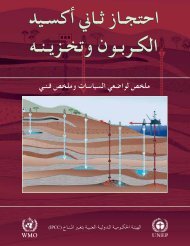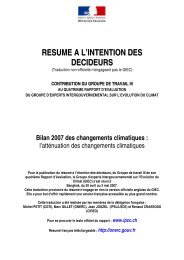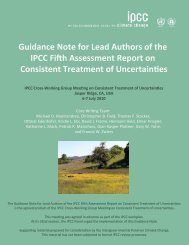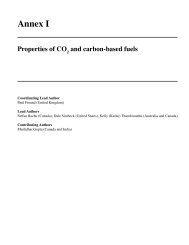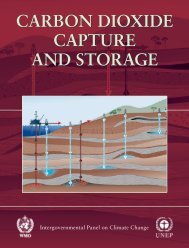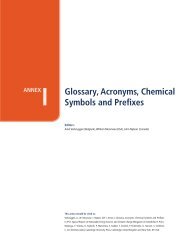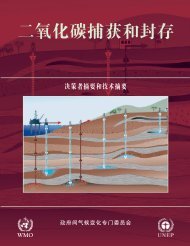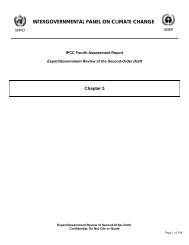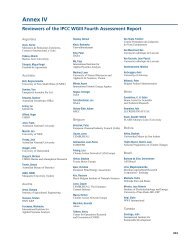SODBatch A&B SPM Comments co-chair response final ... - ipcc-wg3
SODBatch A&B SPM Comments co-chair response final ... - ipcc-wg3
SODBatch A&B SPM Comments co-chair response final ... - ipcc-wg3
Create successful ePaper yourself
Turn your PDF publications into a flip-book with our unique Google optimized e-Paper software.
Chapter-<br />
Comment<br />
para<br />
324 he<br />
ad<br />
in<br />
<strong>SPM</strong>-<br />
325<br />
<strong>SPM</strong>-<br />
326<br />
<strong>SPM</strong>-<br />
327<br />
<strong>SPM</strong>-<br />
328<br />
g<br />
5<br />
he<br />
ad<br />
in<br />
g<br />
5<br />
he<br />
ad<br />
in<br />
g<br />
5<br />
he<br />
ad<br />
in<br />
g<br />
5<br />
he<br />
ad<br />
in<br />
g<br />
Batch<br />
From Page<br />
From Line<br />
To Page<br />
To line<br />
<strong>Comments</strong><br />
IPCC WGIII Fourth Assessment Report, Se<strong>co</strong>nd Order Draft<br />
(Government of Spain)<br />
A 5 1 5 6 To be accurate, I believe that this should read, "…it is technically<br />
feasible to stabilise GHG <strong>co</strong>ncentrations in the atmosphere, even at<br />
levels below 450 ppmv CO2 eq, provided that…" I believe that a<br />
significant percentage of the 16 studies reviewed in this 'band' are<br />
scenarios for <strong>co</strong>ncentrations of less than 450 ppmv CO2eq.<br />
(Steve Sawyer, Greenpeace International)<br />
A 5 1 0 5 This wording suggests that stabilisation below 450ppmv CO2-eq is<br />
not feasible; if so, this crucial <strong>co</strong>nstraint should be explicitly stated<br />
and defended here as well as in the body of the report. The<br />
wording also suggests that 450ppmv is "low": it is low only in<br />
relative terms when <strong>co</strong>mpared with a selected range of higher<br />
potential stabilisation levels; it is not low when <strong>co</strong>mpared with preindustrial<br />
<strong>co</strong>ncentrations. The failure to mention lower stabilisation<br />
levels such as returning to pre-industrial levels represents an<br />
unexplained gap and potentially an artificially truncated range of<br />
policy options.<br />
(Stephen Sheppard, University of British Columbia)<br />
A 5 1 5 4 For stabilization "as low as 450 ppm CO2-equivalent", emissions<br />
almost certainly need to peak much sooner than just "within the<br />
next few decades."<br />
(Paul Baer, E<strong>co</strong>Equity)<br />
A 5 1 6 1 The statement that lower stabilisation requires earlier peaking of<br />
emissions is only <strong>co</strong>rrect if one assumes certain <strong>co</strong>nstraints on the<br />
stabilisation pathway. Theoretically, one <strong>co</strong>uld overshoot to<br />
1000ppm and still stabilise at 400ppm equivalent a few hundred<br />
years later, eg through a widespread development of bioenergy plus<br />
CCS in the 22nd and 23rd centuries. Footnote 3 says that overshoot<br />
pathways are designed to keep global mean temperature below the<br />
eventual equilibrium level. This (subjective!) <strong>co</strong>nstraint on<br />
Expert Review of Se<strong>co</strong>nd-Order-Draft<br />
Confidential, Do Not Cite or Quote<br />
Response suggested by <strong>co</strong><strong>chair</strong>s<br />
TIA; heading text to be deleted,<br />
but wording to be used for<br />
merging with para 6<br />
TIA; heading text to be deleted,<br />
but wording to be used for<br />
merging with para 6<br />
TIA; heading text to be deleted,<br />
but wording to be used for<br />
merging with para 5, check with<br />
new table 1.<br />
TIA; heading text to be deleted,<br />
but wording to be used for<br />
merging with para 6<br />
Suggestions to be taken up in<br />
TS and ch 3<br />
Action<br />
for<br />
chapter<br />
Considerations<br />
by the writing<br />
team<br />
TS, 3 accept. Text to<br />
be revised<br />
(3)<br />
Page 80 of 348



